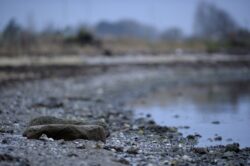Innocent Victims Camp Lejeune Water Contaminations Devastating Impact on Fetuses and Babies
A cataclysmic event unfolded between 1953 and 1987 at Camp Lejeune, North Carolina. Unbeknownst to residents, they consumed water contaminated with harmful toxins, leading to severe health implications, prominently exhibited in fetuses and infants.

This article explores the devastating effects of this insidious contamination on the most vulnerable victims, delves into the legal repercussions, and elucidates the role of the Camp Lejeune Justice Act in providing recourse for the affected families.
Key Takeaways
- Thousands of fetuses were stillborn or born with birth defects due to drinking contaminated water at Camp Lejeune.
- Pregnant mothers who drank Camp Lejeune water put their unborn babies at risk of developmental issues and health problems.
- Babies and young children who drank contaminated water at Camp Lejeune experienced stunted physical and neurological development.
- Some children who were exposed to the contaminated water at Camp Lejeune have developed cancer and Parkinson's disease as adults.
Unveiling the Tragic Effects of Camp Lejeune’s Contaminated Water on Pregnant Women

Exposure to the contaminated water at Camp Lejeune during pregnancy has been linked to severe health consequences, including an alarming number of stillbirths and birth defects in fetuses, as reported by the Agency for Toxic Substances and Disease Registry.
The long term effects of Camp Lejeune water contamination on maternal health are being studied to understand the full range of possible health outcomes.
The contamination, which occurred over decades, highlights the critical need for preventive strategies to avoid similar water contamination incidents in the future. These strategies include rigorous water testing, stringent regulations for hazardous waste disposal, and increased public awareness about the dangers of water contamination.
Such measures are essential to protect vulnerable populations, such as pregnant women and their unborn children, from the devastating health effects of water contamination.
The Harrowing Consequences of Camp Lejeune’s Tainted Water on Newborns and Infants

Detrimental effects on neonates and infants, resulting from the consumption of tainted liquid, have been extensively documented in recent studies. Research linked to Camp Lejeune's water contamination reveals the long term effects on cognitive development, which are profound and irreversible. Furthermore, the emotional toll on affected families is significant, as they grapple with the health challenges of their beloved children.
| Impact on Neonates and Infants | Long-term Consequences |
|---|---|
| Stunted physical development | Chronic health issues |
| Delayed cognitive development | Learning disabilities |
| Birth defects | Increased risk of cancer |
| Neurological damage | Emotional and psychological disorders |
The Lingering Health Issues in Children Exposed to Camp Lejeune’s Polluted Water

Long-term health complications, including stunted physical and neurological development, have been observed in children who ingested the polluted fluid during their early stages of life. These effects were notable amongst those exposed to Camp Lejeune's contaminated water.
The polluted fluid was found to contain a mix of volatile organic compounds, proven to be deleterious to human health. Research conducted by the Agency for Toxic Substances and Disease Registry highlighted an alarming correlation between the ingestion of Camp Lejeune's polluted water and the manifestation of serious health complications later in life.
These long-term effects varied, encompassing a range of developmental and cognitive impairments, and even chronic diseases. The findings underscore the need for comprehensive measures to prevent and mitigate environmental health risks.
Notable Legal Proceedings Related to the Camp Lejeune Water Contamination Crisis

Significant legal proceedings have emerged in response to the water contamination crisis, with numerous lawsuits being filed by those affected. These court actions primarily seek to address the deleterious health impact sustained by victims, particularly the young ones, due to exposure to the contaminated water at Camp Lejeune.
The cases are aimed at achieving justice for the victims and their families by holding accountable those responsible for the crisis. The compensation levels are determined based on the severity of the health impact and the extent of the exposure.
The legal proceedings are complex, involving a multitude of variables, and hence require rigorous scrutiny of each claim. This ensures that the victims receive the compensation they deserve, thereby providing them some solace in the face of the irreversible damage they have suffered.
Understanding the Camp Lejeune Justice Act and Its Implications for Victims

The enactment of the Camp Lejeune Justice Act has opened avenues for legal recourse for individuals and families affected by toxic exposure, providing a platform for filing federal law tort claims. Analysis of long-term health effects on adults exposed to Camp Lejeune water reveals diverse range of systemic diseases, including various cancers and neurological disorders. The environmental impact of Camp Lejeune water contamination is equally significant, with persistent issues undermining the health of the local ecosystem.
| Key Findings | Details |
| Long term health effects | Adults exposed to contaminated water show increased prevalence of systemic diseases |
| Environmental impact | Persistent ecological issues due to water contamination |
| Legal recourse | The Camp Lejeune Justice Act enables victims to file federal law tort claims |
This comprehensive insight underscores the urgency for remedial actions and enhanced environmental health policies.
A Closer Look at Recent Developments in Camp Lejeune Water Contamination Lawsuits

Recent developments in litigation related to toxic exposure have brought renewed attention to the health consequences experienced by individuals residing in certain military bases between 1953 and 1988.
The long-term effects of Camp Lejeune water contamination on child development have been particularly alarming, with several studies indicating irreversible physical and neurological damage.
Moreover, these lawsuits underscore the importance of accountability in cases of environmental contamination.
While the Camp Lejeune Justice Act has provided an avenue for victims to seek redress, it has also revealed broader systemic failures in managing environmental health risks.
It is critical for future policy to learn from these experiences, to ensure the protection of vulnerable populations from the tragic consequences of environmental negligence.
The Role of Law Firms in Assisting Camp Lejeune Water Contamination Victims

Law firms play a crucial role in advocating for individuals and families affected by the harmful pollutants found in the water supply of a prominent military base. They provide both legal representation and assistance in filing claims under enacted legislation. Their importance is underscored by the vital need for compensation for victims, given the long-term effects on affected families.
These effects include:
- Chronic health conditions resulting from exposure
- Enduring psychological trauma associated with illness or loss
- Financial burdens from ongoing medical expenses
- The struggle of caring for a loved one battling illness
- The challenge of seeking justice against a formidable adversary
Through relentless pursuit of justice, these firms strive to ensure that affected individuals and families receive the compensation they deserve. This underscores the critical importance of their work.
Frequently Asked Questions
What Specific Contaminants Were Found in the Camp Lejeune Water Supply?
The Camp Lejeune water supply contained notable contaminants, including trichloroethylene, tetrachloroethylene, benzene and vinyl chloride. These were discovered via a Contaminant Source Investigation, with Health Impact Studies indicating significant detrimental effects on human health.
How Long Did the Water Contamination at Camp Lejeune Last?
The water contamination at Camp Lejeune persisted for approximately 34 years, from 1953 to 1987, with significant contamination aftermath and profound health implications for the base's residents, particularly fetuses and young children.
What Is the Current State of the Water Supply at Camp Lejeune?
Contamination prevention and remediation steps have been undertaken at Camp Lejeune to rectify water supply issues. Current state indicates significant improvements, highlighting the efficacy of implemented strategies for environmental health and safety.
Are There Any Ongoing Health Monitoring Programs for Those Exposed to Camp Lejeune’s Contaminated Water?
Ongoing health monitoring programs for those exposed to Camp Lejeune's contaminated water are operational. They aim to document exposure effects and provide essential support systems, thereby facilitating long-term tracking of potential health impacts.
How Can Victims of the Camp Lejeune Water Contamination Seek Medical Help or Compensation if They Weren’t Present During the Specified Time Frame of 1953 to 1987?
Legal avenues for Camp Lejeune water contamination victims outside the 1953-1987 timeframe may be limited. However, compensation eligibility could be explored through alternative litigation or legislative changes, pending further scientific evidence and legal discourse.

This post has been generated by AI and was not reviewed by editors. This is Not legal advice. Please consult with an attorney.




